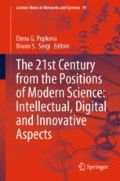Abstract
Purpose: The purpose of the research is to determine the scenarios of socio-economic development of Russia under the influence of technological revolution in the 21st century, until 2030.
Design/methodology/approach: The authors determine the causal connections of the technological revolution in the 21st century with the help of the materials of a statistical collection of the National Research University “Higher School of Economics” “Digital economy – 2019”, which reflect the factors that restrain the usage of the Internet (as the most revolutionary technology of modern times) by the population.
Findings: It is substantiated that the technological revolution in the 21st century is a very complex and variable process, which could take place according to one of the three scenarios, depending on formation of digital society and adoption of artificial intelligence. Scenario of deintellectualization is most probable in modern Russia, and its signs are seen as of now. It envisages low level of development of the digital society and low interest of consumers in artificial intelligence due to insufficient marketing support. That’s why investment flows will be redirected in favor of conventionally revolutionary (not providing completely new opportunities) intellectual technologies. Scenario of segmental intellectualization is also rather probably in Russia, as it is traditionally peculiar for the processes of innovative development of the Russian economy (e.g., it could be realized during dissemination of mobile communications). This scenario envisages elitism of artificial intelligence until 2030, due to its high cost. Scenario of intellectual breakthrough is most probable, but least probable in Russia. It is connected to mass dissemination of artificial intelligence – in entrepreneurship, consumption, and state management. The key condition of its implementation is active marketing support for artificial intelligence.
Originality/value: The described scenarios reduce uncertainty and open wide opportunities and perspectives for state management of technological revolution in modern Russia.
Access this chapter
Tax calculation will be finalised at checkout
Purchases are for personal use only
References
Ansong, E., Boateng, R.: Surviving in the digital era – business models of digital enterprises in a developing economy. Digit. Policy Regul. Gov. 21(2), 164–178 (2019)
Bogoviz, A.V., Alekseev, A.N., Ragulina, J.V.: Budget limitations in the process of formation of the digital economy. Lect. Notes Netw. Syst. 57, 578–585 (2019a)
Bogoviz, A.V., Lobova, S.V., Ragulina, J.V.: Distortions in the theory of costs in the conditions of digital economy. Lect. Notes Netw. Syst. 57, 1231–1237 (2019b)
da Silva, V.L., Kovaleski, J.L., Pagani, R.N.: Technology transfer in the supply chain oriented to industry 4.0: a literature review. Technol. Anal. Strateg. Manag. 31(5), 546–562 (2019)
Hodžić, S.: Tax administrative challenges of the digital economy: the Croatian experience. eJournal Tax Res. 16(3), 762–779 (2019)
Hrustek, N.Ž., Mekovec, R., Pihir, I.: Developing and validating measurement instrument for various aspects of digital economy: E-commerce, E-banking, E-work and E-employment. Int. J. E-Serv. Mob. Appl. 11(1), 50–56 (2019)
Masood, T., Egger, J.: Augmented reality in support of Industry 4.0—Implementation challenges and success factors. Robot. Comput.-Integr. Manuf. 58, 181–195 (2019)
Mueller, M., Grindal, K.: Data flows and the digital economy: information as a mobile factor of production. Digit. Policy Regul. Gov. 21(1), 71–87 (2019)
Popkova, E.G.: Economic and Legal Foundations of Modern Russian Society: A New Institutional Theory. Advances in Research on Russian Business and Management. Information Age Publishing, Charlotte (2017)
Popkova, E.G.: Preconditions of formation and development of industry 4.0 in the conditions of knowledge economy. Stud. Syst. Decis. Control 169, 65–72 (2019)
Popkova, E.G., Sergi, B.S.: Will industry 4.0 and other innovations impact Russia’s development? In: Exploring the Future of Russia’s Economy and Markets, pp. 34–42. Emerald Publishing (2019)
Sergi, B.S., Popkova, E.G., Bogoviz, A.V., Ragulina, J.V.: Entrepreneurship and economic growth: the experience of developed and developing countries. In: Entrepreneurship and Development in the 21st Century, pp. 3–32. Emerald Publishing Limited (2019)
National Research University “Higher School of Economics”: Digital economy – 2019: a short statistical collection (2019). https://www.hse.ru/data/2018/12/26/1143130930/ice2019kr.pdf. Accessed 09 May 2019
Acknowledgments
The research has been performed with financial support from the Russian Foundation for Fundamental Research within scientific project No. 18-010-00103 A.
Author information
Authors and Affiliations
Corresponding author
Editor information
Editors and Affiliations
Rights and permissions
Copyright information
© 2020 Springer Nature Switzerland AG
About this paper
Cite this paper
Popkova, E.G., Gulzat, K. (2020). Technological Revolution in the 21st Century: Digital Society vs. Artificial Intelligence. In: Popkova, E., Sergi, B. (eds) The 21st Century from the Positions of Modern Science: Intellectual, Digital and Innovative Aspects. ISC 2019. Lecture Notes in Networks and Systems, vol 91. Springer, Cham. https://doi.org/10.1007/978-3-030-32015-7_38
Download citation
DOI: https://doi.org/10.1007/978-3-030-32015-7_38
Published:
Publisher Name: Springer, Cham
Print ISBN: 978-3-030-32014-0
Online ISBN: 978-3-030-32015-7
eBook Packages: Intelligent Technologies and RoboticsIntelligent Technologies and Robotics (R0)

